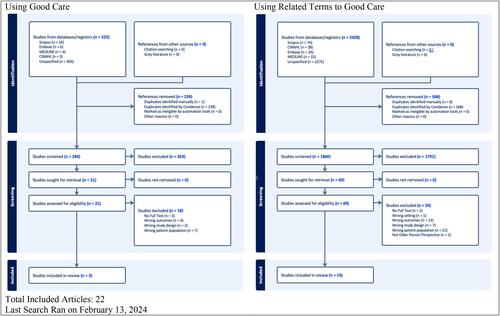(Re)conceptualising Good Care in Hospital Settings From the Perspectives of Older Persons: A Concept Analysis Using Pragmatic Utility
Abstract
Purpose
To understand good care from the perspective of hospitalised older persons.
Background
Older persons are the largest group of hospital users, and numbers will increase in the next decades. Hospital organisations are attempting to transform traditional care models to meet the specialised needs of hospitalised older persons. To achieve this, healthcare providers including nurses and administrators need to understand the perspectives of hospitalised older persons on what constitutes good care. This knowledge is critical to nursing to ensure that care aligns with the perceived needs of hospitalised older persons. However, good care from the viewpoints of hospitalised older persons remains ambiguous and poorly delineated in the literature.
Methods
We conducted a concept analysis using the pragmatic utility method. To identify peer-reviewed articles, we searched CINAHL, MedLine, PsycINFO, Scopus and Embase databases for related literature using the keywords and related terms to ‘good care’, ‘hospital or acute care’ and ‘older persons’.
Results
Twenty-two peer-reviewed articles out of 2144 search results were included. The heterogeneity of older persons' perspectives and limitations in the literature on good care led to a tentative understanding. Good care, a partially mature concept, is the provision of person-centred, culturally sensitive, holistic and integrated care that fosters autonomy, control and participation, resulting in a sense of belonging, smooth transitions, optimal management of clinical conditions, satisfaction in care and informed older persons and family caregivers.
Conclusion
Older persons are a heterogeneous group with diverse perceptions of good care. Instead of seeking a common understanding of good care, efforts should be focused on identifying individual preferences, values and goals of hospitalised older persons.
Implications for Practice
The components of good care are important for many hospitalised older persons and can serve as a starting point for improvements in practice settings. However, this understanding is tentative and may overlook critical aspects of care at an individual level. Hospital organisations, healthcare providers and nurses should be cognizant of this limitation and cultivate adaptability for an individualised approach to care.


 求助内容:
求助内容: 应助结果提醒方式:
应助结果提醒方式:


